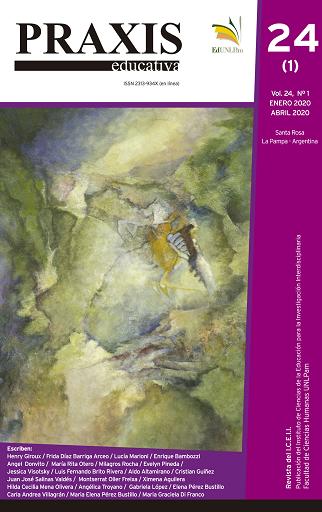We must overcome our atomization to beat back neoliberal fascism / Debemos superar la atomización para deshacernos del fascismo neoliberal
DOI:
https://doi.org/10.19137/DOI:%20https://dx.doi.org/10.19137/praxiseducativa-2020-240102Palabras clave:
Keyword, education, social atomization, political authoritarianism, neoliberal fascism, pedagogy, hope.Resumen
The work focuses on education, social atomization and the terror of political authoritarianism and neoliberal fascism. Two different political tremors that shake the world these days are analyzed: on the one hand, the spread of resistance to the emerging neo-fascism; and on the other, a new emergence in massive forms of collective resistance against neoliberalism. The question lies about how education gives rise to ways of selftraining that can allow people to resist fascist and neoliberal mentalities. Pedagogy, as a resistance tool, opens a space for translation, criticism and resistance. This is particularly crucial in the face of atomization that isolates individuals and fosters a sense of helplessness by stating that the existing order cannot be changed. In order to dismantle these regimes, we must also find a way to break the atomization patterns that make them possible. Without hope there is no possibility of resistance, dissent and struggle. Organization is a condition for struggle, and hope is s condition for organization. Hope expands the space of the possible and
becomes a way to recognize and name the incomplete nature of the present.
Descargas
Descargas
Publicado
Número
Sección
Licencia
Nota de copyright
Comité Editorial Revista Praxis educativa:
Por la presente declaro que soy autor del artículo titulado (nombre del artículo), que el mismo es original y propio y que no fue publicado en ningún otro formato o soporte con anterioridad. Manifiesto conocer que la revista no me cobrará ningún tipo de tasa bajo ningún concepto, ni recibiré ningún tipo de compensación monetaria
Si el mismo fuera aceptado para su publicación en Praxis educativa, autorizo a la referida revista a publicarlo en forma digital y a publicitarlo en sus redes sociales.
Si el trabajo fuera publicado, adhiero a la licencia Creative Commons denominada “Atribución - No Comercial Compartir igual CC BY-NC-SA”, mediante la cual se permite copiar, reproducir, distribuir, comunicar públicamente la obra y generar obras derivadas, siempre y cuando se cite y reconozca al autor original. Esta licencia se utiliza desde septiembre 2018. En 2016 se adhirió a CC BY NC ND 4.0; y en años 2017 y 2018 (enero -agosto) CC BY NC 4.0..
Esta licencia CC BY-NC-SA Compartir igual no permite, sin embargo, utilizar la obra con fines comerciales. Como autor la revista podré establecer acuerdos adicionales para la distribución no exclusiva de la versión de la obra publicada en la revista me permite el autoarchivo de los artículos publicados, en su versión post-print, en repositorios institucionales, temáticos, páginas web personales o cualquier otro uso pertinente. con el reconocimiento de haber sido publicado primero en esta revista.
Praxis educativa adhiere a DORA (Declaration on Research Assessment) firmada en San Francisco, California, el 16 de diciembre de 2012, y a la Declaración de México (Declaración Conjunta LATINDEX - REDALYC - CLACSO - IBICT).















_(1)2.png)


3.png)










_(2).png)






2.jpg)
8.png)









